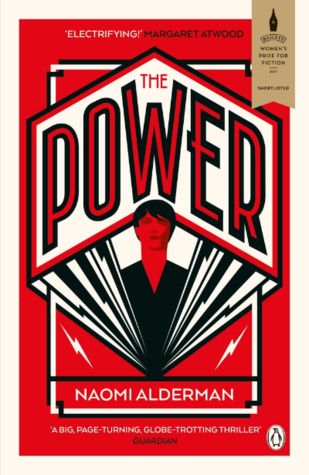The Power - Naomi Alderman
"Jews: look to Miriam, not Moses, for what you can learn from her. Muslims: look to Fatimah, not Muhammad. Buddhists, remember Tara, the mother of liberation. Christians: pray to Mary for your salvation." It is through these haunting words that Naomi Alderman creates a novel so bold and so daring in order to show us how the present structures of society need a change, and offers us a glimpse of what would happen if you flipped the gender roles in which women rule the world. What would then happen if men lived in fear of women?
The Power begins as teenage girls over the world discover they can release electrical jolts from their fingertips, ranging from a slight tickle to the ability to kill. Men are segregated for their own safety, countries verge on war on a day-to-day basis as more girls harness this 'power' and use it to awaken it in older women. As this all unfolds, the story weaves between four narrative voices: Roxy, daughter of a London mobster, Allie, a teenage runaway who reinvents herself under the new persona of 'Mother Eve' as she becomes a cult leader and a worldwide phenomenon. Margot is an American Politician desperate to protect her daughter through her new-found strength and Tunde is an attractive male Nigerian journalist reporting on the seismic global change. Interestingly the novel is structurally presented as a manuscript from "Neil Adam Armon" to "Naomi" as he asks her advice upon finishing reading his manuscript. These interactions bookend the novel and gives it a terrific meta twist, very much what Atwood did with the ending of The Handmaid's Tale.
I truly cannot even begin to describe how much I enjoyed this novel. It packs many punches throughout on such a rapid pace, continually reminding the reader of a countdown to some sort of a cataclysmic event, which leaves you riddled with suspense. But what struck me, as I hope will strike many readers, is how the reversal of society's structure really highlights the extremity of how women suffer in the world today. For example, there are diagrams in the novel depicting a 'curbing' procedure - also known as male genital mutilation. FMG is something that is horrifically happening in the world today and there seems to be very little awareness of it or even simple acknowledgement of the issue, so by turning things on their head, it creates the awareness that should be existing. A friend of mine rightly said how it shows the extent to which we place our own ideas of society onto historical evidence, which in itself retrospectively perpetuates sexism.
The new schematics of sexual violence and power further holds up a mirror to our current reality. Early on in the novel, a fraction of men enjoy the sensation of being hurt by the women's power, being encompassed into pornography, but this is taken to new extremes when a man is violently raped by a gang of women as Tunde watches from afar, helpless, demonstrating his new position as the 'weaker' sex. As the man climaxes, he is killed instantly by a jolt to the heart as the women laugh and seek out a new victim. Our culture often blurs this distinguishable line between consensual, if a little rough, sex and sexual domestic violence, so for Alderman to switch the positions of attacker and victim, it becomes a bold, but thought-provoking statement against our current world.
Futhermore, the idea of 'power' was something that was developed over the book. How it wasn't just about the literal power women had within them, but the power they had over men, socially and politically. Margot, for example, is corrupted by her own power to rise to the top of American Politics, which ironically is heightened during a TV debate when she loses control and accidentally jolts one of her political opponents. Roxy, inadvertently becomes the new crime boss after she is double crossed by her father and Mother Eve becomes a household name in which thousands flock to see her in the flesh. The new society which has been created for these women adds an amount of pressure, one can assume that has shifted from male to female, and we as the reader, see these women tackle this pressure head on; some succumb to it, others fare lucky. The abuse of power goes beyond gender dynamics in this novel and there is no clear answer as to why both men and women abuse this power, but that's what makes The Power a fantastic read.
That is to say the book isn't perfect. Some of the sections in the book feel too long or drawn out, characters such as Roxy feel horribly stereotyped ("Bleeding hell, it's only you I've been flippin' looking for!") but thankfully, these things do not defer from the novel too much. I've read other reviews criticising the overtly religious aspects of the novel, but again, I think it does not defer from the main plot points. If anything, it is another signifier for the imbalance of 'power' between men and women today, especially in the church. But that is another debate for another time.
A brilliant, thought-provoking novel that casts beautiful meditations on the concept of power, possibility and change, The Power is The Handmaid's Tale for a new generation wanting to explore dystopian fiction; especially those who one day may want to question how the natural dominance of women over men came to be.
★★★★
Published by Penguin Books
Special thanks to Penguin Random House for the proof copy.

Comments
Post a Comment